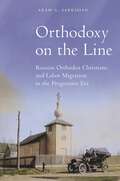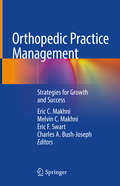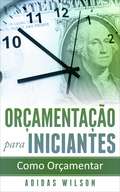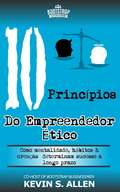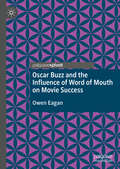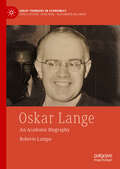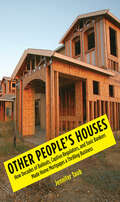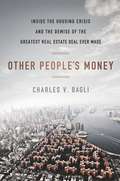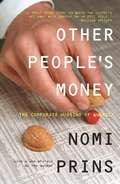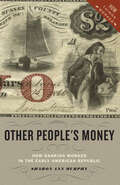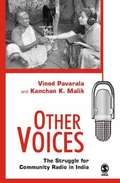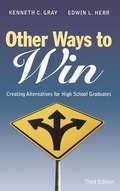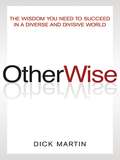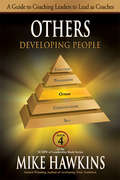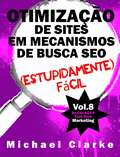- Table View
- List View
Orthodoxy on the Line: Russian Orthodox Christians and Labor Migration in the Progressive Era (North American Religions)
by Aram G. SarkisianWorking-class immigration, religion, and labor history in the United StatesAt the turn of the twentieth century, thousands of immigrants from the borderlands of the Russian and Austro-Hungarian Empires built a transnational church in North America. The community that church leaders called American Orthodox Rus’ was created by and for working people, and transformed believers’ identities as Eastern European migrants, as Orthodox Christians, and as American workers.Given how strongly the Russian Orthodox Christian community was tied to working class industrial life, this book makes the case that we cannot understand the scope of working class and immigrant religion in the United States without understanding American Orthodox Rus’. The work Russian Orthodox immigrants did in the Progressive Era United States occurred in factories, foundries, and mines; they lived mainly in industrial cities and mining towns; and they almost immediately got caught up in the most pivotal—and sometimes violent—political and social crises of their times, both nationally and internationally. To address their needs in these contexts, the Russian Orthodox Church expanded its missionary efforts in North America, forming a network of social and material aid for working-class believers. This book traces the rapid growth of this transnational religious world, then explores its unexpected collapse under the weight of the First World War, a global pandemic, and the transnational reach of revolutionary political change in Russia. A story of challenge and resilience, Orthodoxy on the Line complicates dominant paradigms in the study of labor and North American Religions.
Orthopedic Practice Management: Strategies for Growth and Success
by Melvin C. Makhni Eric C. Makhni Eric F. Swart Charles A. Bush-JosephThis unique resource provides a solid introduction to practice management for orthopedic practitioners—whether employed in a hospital setting, in private practice, or on faculty at a university setting—and it will be especially valuable to all surgeons still in their residency, providing valuable insight into how to best prepare to effectively care for patients. Orthopedists both domestic and international will benefit immensely from its contents, skills that are often overlooked in medical training. Part one presents the essentials of starting and building a practice, including strategic, personal and legal considerations, partnerships and ancillaries, keys for growth and success, incorporating mid-level providers, and the use of social media. Leadership and management are covered in part two, discussing the management of a private practice and a privademic medical center, recruitment and expansion, outcome collections, the pursuit of a dual degree, and all-important healthcare policy. Additional relevant topics are presented in part three, including surgical training and education, independent medical exams and legal depositions, board certification and maintenance, principles of clinical research, and surgical innovation. In today’s ever-changing healthcare climate, practitioners must know how to deliver the medicine they spent so many years learning and perfecting. Orthopedic Practice Management is the first text dedicated to teaching surgeons the essential non-clinical fundamentals for succeeding in healthcare. No matter what stage of practice you are in—from student to master surgeon—you will find that this book contains invaluable information for achieving success in orthopedics.
Orçamentação para Iniciantes: Como Orçamentar
by Adidas WilsonSe a maior parte das pessoas tivessem opção de escolha, prefeririam não ter um orçamento. É limitante e exige muito sacrifício e esforço. Nunca poderá ter falta de desculpas por não ter um orçamento — estar demasiado ocupado, esperar que as coisas mudem brevemente, não ganhar o suficiente, etc. Contudo, um orçamento é poderoso. Vai ajudá-lo a solidificar o seu futuro financeiro, mesmo que não faça muito.
Os 10 Princípios do Empreendedor Ético
by Kevin S Allen Tatiana El-Id KanhoucheConsiderando os milhares de livros sobre empreendedorismo disponíveis no mercado, o que faz “Os 10 Princípios do Empreendedor Ético” diferente? A maioria desses livros está cheia de truques para enriquecer rápido e esquemas para ganhar dinheiro rápido. No entanto, esse livro não tem essas características. Eu vou te ensinar a criar e desenvolver um negócio com honestidade, integridade e foco no cliente, e não apenas no dinheiro. Os princípios citados nesse livro vão ensinar como ser honesto, autêntico e verdadeiro com você mesmo e seus clientes, se implantar e segui-los diariamente. Ser honesto é uma das principais características de um empreendedor, na verdade de qualquer pessoa, mas muito difícil de encontrar hoje em dia. Ser um empreendedor é incrível, tempo, liberdade, dinheiro, viagens, que às vezes nos esquecemos o motivo pelo qual começamos: servir às pessoas. Nos perdemos na busca por dinheiro e esse livro vai lhe ajudar a ser o empreendedor honesto, autêntico e confiável que sempre quis ser.
Os Empreendedores Espirituais: Gestão empresarial em perspectiva espiritual
by Marc BacoO livro é um ótimo aprendizado sobre como empreender seus negócios,literalmnte, de corpo e alma. O empreendedor espiritual supera seus colegas materialistas aplicando leis de espiritualidade em sua empresa. O livro descreve sugestões e técnicas de se fazer isso, passando ensinamento para empreendedores e fundadores que estãomudando sua maneira de pensar em relação a empresa e a si mesmos.
Os Políticos de Facebook no Oriente Médio
by Wael El-Manzalawy P. H. Leal.O mundo assistiu à milhões de árabes fazendo demonstrações revolucionárias nas praças. Mas a revolução começou no Facebook e no Twitter. Por exemplo, a página "We are All Khaled Saeed" organizou a primeira demonstração na Revolução Egípcia. Este livro é uma tentativa de analisar o fenômeno dos políticos de Facebook no Oriente Médio. Minha experiência como um político de Facebook me deu a oportunidade de analisar e criticar o fenômeno por dentro.
Os segredos para ser um bom gestor ou supervisor – Lições aprendidas por quem já trabalhou na área
by Richard G Lowe Jr Nícolas PoloniTrabalhar para um bom gestor pode ser uma experiência incrível e gratificante porque ele entende como delegar autoridade, responsabilidades e tarefas para pessoas e grupos. Gestores ruins designam tarefas e definem prazos arbitrariamente e, depois, para piorar, não fornecem os recursos adequados para que as metas sejam atingidas. O objetivo deste livro é transmitir a você, caro leitor, uma filosofia de como obter sucesso como gestor ou supervisor de pessoas. Aqui você vai descobrir que o melhor aprendizado vem de mentores, cursos rápidos, livros e da escola da vida: a experiência.
Osaro: Picking the best path
by William R. Kerr James Palano Bastiane HuangThe founder of Osaro saw the potential of deep reinforcement learning to allow robots to be applied in a wide range of new applications. Osaro targeted warehousing, already a dynamic industry for robotics and automation, for its initial product - a system which allowed robotic arms to "pick and place" individual items into boxes for shipment to consumers. Despite receiving significant attention in the robotics space, the problem of universal "picking" had not been solved. Osaro believed deep reinforcement learning would provide the solution by allowing robots to handle the complexity involved in perceiving and grasping a wide range of objects. The case discussion will focus on the decision to choose the warehouse automation market, provide an overview of key machine learning concepts, and introduce students to some of the contours of competing in the machine learning space during the late 2010s. The case also introduces key concepts for thinking about how the combination of artificial intelligence and robotics will change work in the future.
Oscar Buzz and the Influence of Word of Mouth on Movie Success
by Owen EaganThis book explores why word of mouth is the most important determinant of a movie’s success. Beginning with a discussion of the enduring appeal of movies, and why the box office has survived the disruption of television and will likely survive the disruption of streaming services, Owen Eagan goes on to discuss the unpredictable nature of movies and ways to mitigate their risk. His astute analysis sheds light on the role of film festivals, film critics, Oscar campaigns, and word of mouth in influencing a film's success. Eagan concludes with a summary of why word of mouth is the most influential among all the variables that affect a film’s outcome. Expertly synthesizing quantitative analyses of box office data with illuminating insights from industry experts, this concise and engaging book presents findings with important implications for scholars, industry insiders and marketing professionals alike.
Oscar Mayer: Strategic Marketing Planning
by John A. Quelch Dan Kotchen Robert DraneThe marketing director of Oscar Mayer faces a series of strategic marketing options regarding established and new products, including budget and capacity allocation decisions.
Oskar Lange: An Academic Biography (Great Thinkers in Economics)
by Roberto LampaThis book examines the academic life of Oskar Lange and his contribution to economics. It charts the development of his ideas across his working life and reflects on how the events of this period shaped his view of economics. His early engagement with European Marxism during the 1920s is outlined, as well as the ways that the 1929 economic crash encouraged Lange to evaluate the social dimension of economics and consider the economic underpinnings of a socialist planned economy. Lange&’s engagement with debates surrounding the theory of production, capital, the theory of interest, welfare economics, and general equilibrium during the 1930s and 1940s are outlined and provide insight into how Lange viewed the key economic debates of the day. The legacy of Lange, not just within socialist economics, but within the discipline more generally, is discussed to reflect upon his place within the Marxist tradition and his relevance within modern economics. This book offers unique insight into the work and legacy of Oskar Lange. It will be of interest to students and researchers working within the history of economic thought and the political economy.
Otc Derivatives: Bilateral Trading & Central Clearing
by David MurphyThe OTC derivatives market has been hit by a massive wave of regulatory change. Capital and margin requirements have increased, trade reporting has been mandated, and execution mechanisms are evolving. Most of all, central clearing is being imposed for many transactions. OTC Derivatives: Bilateral Trading and Central Clearing explains the new rules and the new models. It discusses the traditional bilateral market, then sets out how this will change due to mandatory central clearing and the new ways in which OTC derivatives will have to be traded, reported, and processed. The risks of OTC derivatives clearing houses are discussed in detail, as are the protections that CCPs have against these risks. The book also looks at alternatives to some of the policy decisions that have been made, showing the balance between costs and benefits of various different approaches to derivatives market stability. The book is both a detailed primer on OTC derivatives clearing and a powerful insight into post-crisis financial regulation. Key features of the book include: A discussion of the capital rules for OTC derivatives counterparty credit risk in Basel III; An account of OTC derivatives trade processing in both bilateral and cleared markets; A detailed account of the risk profile of OTC derivatives CCPs; An explanation of the risks run in various collateral segregation models; and A comparison of various macro-prudential tools for enhancing the financial stability of OTC derivatives markets. "
Other People's Houses: How Decades of Bailouts, Captive Regulators, and Toxic Bankers Made Home Mortgages a Thrilling Business
by Jennifer TaubThe clearest explanation yet of how the financial crisis of 2008 developed and why it could happen againIn the wake of the financial meltdown in 2008, many claimed that it had been inevitable, that no one saw it coming, and that subprime borrowers were to blame. This accessible, thoroughly researched book is Jennifer Taub&’s response to such unfounded claims. Drawing on wide-ranging experience as a corporate lawyer, investment firm counsel, and scholar of business law and financial market regulation, Taub chronicles how government officials helped bankers inflate the toxic-mortgage-backed housing bubble, then after the bubble burst ignored the plight of millions of homeowners suddenly facing foreclosure.Focusing new light on the similarities between the savings and loan debacle of the 1980s and the financial crisis in 2008, Taub reveals that in both cases the same reckless banks, operating under different names, received government bailouts, while the same lax regulators overlooked fraud and abuse. Furthermore, in 2013 the situation is essentially unchanged. The author asserts that the 2008 crisis was not just similar to the S&L scandal, it was a severe relapse of the same underlying disease. And despite modest regulatory reforms, the disease remains uncured: top banks remain too big to manage, too big to regulate, and too big to fail.
Other People's Money
by Charles V. BagliIn just over three years, real estate giant Tishman Speyer and its partner, BlackRock, lost billions of investors' dollars on a single deal. The New York Times reporter who first broke the story of the sale of Stuyvesant Town-Peter Cooper Village takes readers inside the most spectacular failure in real estate history, using this single deal as a lens to see how and why the real estate crisis happened. How did the smartest people in real estate lose billions in one single deal? How did the Church of England, the California public employees' pension fund, and the Singapore government lose more than one billion dollars combined investing in a middle-class housing complex in New York City? How did MetLife make three billion dollars on the deal without any repercussions from a historically racist policy of housing segregation? And how did nine residents of a sleepy enclave in New York City win one of the most unlikely lawsuits in the history of real estate law? Not only does Other People's Money answer those questions, it also explains the current recession in stark, clear detail while providing riveting first-person accounts of the titanic failure of the real estate industry to see that a recession was coming. It's the definitive book on real estate during the bubble years--and what happened when that enormous bubble exploded.
Other People's Money
by Nomi PrinsCritical, independent voices are seldom found within the citadels of international finance. That's what makes Nomi Prins unique. During fifteen years as an executive at skyscraping banks like Goldman Sachs, Bear Stearns, and Lehman Brothers, Prins never lost her ability to see the broader picture. She walked away from the game in 2002 out of disgust with the burgeoning corporate corruption, just as its magnitude was becoming clear to the public.In this acclaimed exposé, named one of the best books of 2004 by The Economist, Barron's, Library Journal, and The Progressive, Prins provides fascinating firsthand details of day-to-day life in the financial leviathans, with all its rich absurdities. She demonstrates how the much-publicized fraud of recent years resulted from deregulation that trashed the rules of responsible corporate behavior, and not simply the unbridled greed of a select few. While the stock market roared on the back of phony balance sheets, executives made out like bandits and Congress looked the other way. Worse yet, as the new foreword to the paperback edition makes clear, everything remains in place for a repeat performance.
Other People's Money: How Banking Worked in the Early American Republic (How Things Worked)
by Sharon Ann MurphyHow the contentious world of nineteenth-century banking shaped the United States.Pieces of paper that claimed to be good for two dollars upon redemption at a distant bank. Foreign coins that fluctuated in value from town to town. Stock certificates issued by turnpike or canal companies—worth something... or perhaps nothing. IOUs from farmers or tradesmen, passed around by people who could not know the person who first issued them. Money and banking in antebellum America offered a glaring example of free-market capitalism run amok—unregulated, exuberant, and heading pell-mell toward the next "panic" of burst bubbles and hard times. In Other People’s Money, Sharon Ann Murphy explains how banking and money worked before the federal government, spurred by the chaos of the Civil War, created the national system of US paper currency. Murphy traces the evolution of banking in America from the founding of the nation, when politicians debated the constitutionality of chartering a national bank, to Andrew Jackson’s role in the Bank War of the early 1830s, to the problems of financing a large-scale war. She reveals how, ultimately, the monetary and banking structures that emerged from the Civil War also provided the basis for our modern financial system, from its formation under the Federal Reserve in 1913 to the present. Touching on the significant role that numerous historical figures played in shaping American banking—including Alexander Hamilton, James Madison, Benjamin Franklin, Henry Clay, Daniel Webster, and Louis Brandeis—Other People’s Money is an engaging guide to the heated political fights that surrounded banking in early America as well as to the economic causes and consequences of the financial system that emerged from the turmoil. By helping readers understand the financial history of this period and the way banking shaped the society in which ordinary Americans lived and worked, this book broadens and deepens our knowledge of the Early American Republic.
Other People's Money: The Real Business of Finance
by John KayThe finance sector of Western economies is too large and attracts too many of the smartest college graduates. Financialization over the past three decades has created a structure that lacks resilience and supports absurd volumes of trading. The finance sector devotes too little attention to the search for new investment opportunities and the stewardship of existing ones, and far too much to secondary-market dealing in existing assets. Regulation has contributed more to the problems than the solutions. Why? What is finance for? John Kay, with wide practical and academic experience in the world of finance, understands the operation of the financial sector better than most. He believes in good banks and effective asset managers, but good banks and effective asset managers are not what he sees. In a dazzling and revelatory tour of the financial world as it has emerged from the wreckage of the 2008 crisis, Kay does not flinch in his criticism: we do need some of the things that Citigroup and Goldman Sachs do, but we do not need Citigroup and Goldman to do them. And many of the things done by Citigroup and Goldman do not need to be done at all. The finance sector needs to be reminded of its primary purpose: to manage other people’s money for the benefit of businesses and households. It is an aberration when the some of the finest mathematical and scientific minds are tasked with devising algorithms for the sole purpose of exploiting the weakness of other algorithms for computerized trading in securities. To travel further down that road leads to ruin.
Other Voices: The Struggle for Community Radio in India
by Vinod Pavarala Kanchan K. MalikThis book is a significant study of an emerging alternative media scene in India in the larger context of the globalization of mass communication. It explores community radio in India. When the trend globally is toward mergers, acquisitions, and concentration of ownership in fewer and fewer corporate hands, civil society organizations all over the world have been promoting such alternative, community-owned media. This study investigates the ideologies and communication practices of various community-based organizations that have been using community radio as a means for empowerment at the grassroots. Adopting the case-study method, the authors do an in-depth analysis of four community radio projects in India-Andhra Pradesh, Karnataka, Gujarat and Jharkhand. This book provides documentation of best practices in community broadcasting, and also appropriate frameworks for policy-making as it includes a comparative study of the policies related to community radio in liberal, democratic countries and a comprehensive assessment of the history of Indian policy-making in broadcasting.
Other Ways to Win: Creating Alternatives for High School Graduates
by Kenneth C. Gray Edwin L. HerrIn this resource for parents, teachers, and counselors, Gray and Herr (both education, Pennsylvania State U. ) suggest ways that students in the academic middle can position themselves for career success without necessarily completing a four-year college degree and taking on a massive load of debt. They dispel some common myths about the nature of economic opportunity and advocate for the restructuring of the high school program of study in a way that creates multiple pathways to success. The third edition has been updated to reflect current educational and employment data. Annotation ©2006 Book News, Inc. , Portland, OR (booknews. com)
OtherWise: The Wisdom You Need to Succeed in a Diverse and Divisive World
by Dick MartinFear of immigrants, ethnic differences, culture wars, political polarization-these are forces that divide us. Otherwise steers us toward common ground in a world of difference.
Others: Developing People (SCOPE of Leadership Book Series #4)
by Mike HawkinsFocus on supporting and coaching employees with the third book in the “most comprehensive treatment of leadership I’ve ever seen by one author” (Jim Kouzes, coauthor of The Leadership Challenge).Others: Developing People guides you in building the skills of others and developing top performers. Great leaders build teams of competent people who are able and willing to take ownership for the work that needs to be performed. By learning the competencies of coaching, enabling, and holding people accountable, you multiply your abilities, transfer your knowledge, and leave an enduring legacy.The SCOPE of Leadership book series teaches the principles of a coaching approach to leadership and how to achieve exceptional results by working through people. You will learn a straightforward framework to guide you in developing, enabling, exhorting, inspiring, managing, and assimilating people. Benefit from the wisdom of many years of leadership, consulting, and executive coaching experience. Discover how to develop the competencies that align consistently with great leadership.
Oticon (A)
by John J. KaoPortrays the change process Oticon went through in moving from a bureaucratic, role-driven organization to a creativity-driven, flexible, informal one.
Oticon A/S: Project 330
by Peter HagstromDescribes the conceptualization and implementation of a totally new organization structure built around projects, knowledge, and personal development. The organization is fluid with almost no formal controls. Physical work space is fundamentally changed and almost all paper is eliminated by extensive use of computerized information systems. However, unexpected early losses threaten the radical organizational transformation.
Otimização de Sites em Mecanismos de Busca SEO (Estupidamente) Fácil
by Michael Clarke Fernando SouzaCom este livro você vai descobrir os segredos para ganhar dinheiro com SEO (Otimização de Sites em Buscadores)! Você não sabe como navegar através de todos aqueles backlinks, tags de título e palavras-chave para, assim, impulsionar seus esforços de marketing do seu site? Quer saber como usar e aplicar técnicas de SEO para difundir sua mensagem, construir sua marca ... e realizar ótimas coisas? Procurando por um guia simples e objetivo para esta rentável (embora muitas vezes confundida) estratégia de marketing on-line? Não se preocupe! Porque com "Otimização de Sites em Mecanismos de Busca SEO (Estupidamente) Fácil" você vai descobrir: • Por que tudo que você sabe sobre SEO está errado; • Por que seu site está ruim de SEO; • Como obter bons backlinks; • Credibilidade nas Mídias Sociais; • Técnicas dos gigantes de SEO. ... e muito mais! E cada capítulo inclui ações fáceis de seguir para ajudá-lo a impulsionar as técnicas de marketing SEO do seu site - sem ter que fazer um curso on-line que custa R$2.000. Então, por que não começar sua missão no campo da Otimização de sites hoje mesmo!
